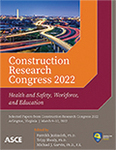Scale Equivalence in Canada and the United States for Interpersonal Conflicts at Work and Individual Resilience in the Construction Sector
Publication: Construction Research Congress 2022
ABSTRACT
Interpersonal conflicts at work (ICW) and individual resilience (IR) that describes a person’s positive psychological capacity for performance improvement have the potential to affect construction safety performance. However, few research has been conducted to investigate these two factors on construction sites, e.g., how often ICW occurs on construction sites and whether the occurrence frequency is distributed similarly across countries. It is also necessary to examine whether workers from different countries interpret ICW and IR conceptually similar, which is a precondition for any comparison. By surveying 420 US construction workers and 837 Canadian construction workers, this study conducted measurement equivalence tests and compared the frequency of ICW on the surveyed construction sites. The results show that US and Canadian construction workers interpreted ICW and IR conceptually similar, although with different demographic background. In addition, US respondents reported fewer conflicts with their supervisors, which may be related to the slightly higher age, lower participation in safety committees, and fewer supervisors on site.
Get full access to this article
View all available purchase options and get full access to this chapter.
REFERENCES
Awang, Z. (2014). Research Methodology and Data Analysis (2nd ed.). Universiti Teknologi Mara, UiTM Press, Malaysia.
Beaujean, A. A. (2014). Latent Variable Modeling Using R: A Step-by-Step Guide. Routledge, New York.
Birditt, K. S., Fingerman, K. L., and Almeida, D. M. (2005). “Age Differences in Exposure and Reactions to Interpersonal Tensions: A Daily Diary Study.” Psychol. Aging, 20(2), 330–340.
BEA (Bureau of Economic Analysis). (2017). “Total Full-Time and Part-Time Employment by NAICS Industry.” <https://www.bea.gov/>(June 11, 2021).
BLS (Bureau of Labor Statistics). (2017). “Number, percent, and rate of fatal occupational injuries by selected worker characteristics, industry, and occupation.” <http://www.bls.gov/iif/>(Apr. 1, 2018).
CCOHS (Canadian Centre for Occupational Health and Safety). (2018). “Joint Health and Safety Committee - What is a Joint Health and Safety Committee?” <https://www.ccohs.ca/oshanswers/hsprograms/hscommittees/whatisa.html>(Jul. 1, 2018).
Chen, Y., McCabe, B., and Hyatt, D. (2017). “Relationship between Individual Resilience, Interpersonal Conflicts at Work, and Safety Outcomes of Construction Workers.” J. Constr. Eng., 143(8), 4017042.
Cigularov, K. P., Lancaster, P. G., Chen, P. Y., Gittleman, J., and Haile, E. (2013). “Measurement equivalence of a safety climate measure among Hispanic and White Non-Hispanic construction workers.” Saf. Sci., 54, 58–68.
Connor, K. M., and Davidson, J. R. T. (2003). “Development of a new Resilience scale: The Connor-Davidson Resilience scale (CD-RISC).” Depress. Anxiety, 18(2), 76–82.
Luthans, F. (2002). “The need for and meaning of positive organizational behavior.” J. Organ. Behav., 23(6), 695–706.
Nixon, A. E., Mazzola, J. J., Bauer, J., Krueger, J. R., and Spector, P. E. (2011). “Can work make you sick? A meta-analysis of the relationships between job stressors and physical symptoms.” Work Stress, 25(1), 1–22.
Schwarzer, R., and Jerusalem, M. (1995). “Generalized Self-Efficacy Scale.” Measures in health psychology: A user’s portfolio, J. Weinman, S. Wright, and M. Johnston, eds., NFER-NELSON, Windsor, UK, 35–37.
Spector, P. E., and Jex, S. M. (1998). “Development of four self-report measures of job stressors and strain: Interpersonal Conflict at Work Scale, Organizational Constraints Scale, Quantitative Workload Inventory, and Physical Symptoms Inventory.” J. Occup. Health, 3(4), 356–67.
Stewart, M., Reid, G., and Mangham, C. (1997). “Fostering children’s resilience.” J. Pediatr. Nurs., 12(1), 21–31.
Vandenberg, R. J., and Lance, C. E. (2000). “A Review and Synthesis of the Measurement Invariance Literature: Suggestions, Practices, and Recommendations for Organizational Research.” Organ. Res. Methods, 3(1), 4–70.
Youssef, C. M., and Luthans, F. (2007). “Positive Organizational Behavior in the Workplace: The Impact of Hope, Optimism, and Resilience.” J. Manag., 33(5), 774–800.
Information & Authors
Information
Published In
History
Published online: Mar 7, 2022
Authors
Metrics & Citations
Metrics
Citations
Download citation
If you have the appropriate software installed, you can download article citation data to the citation manager of your choice. Simply select your manager software from the list below and click Download.
